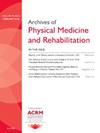Echoes of the Battlefield: Five-Year Longitudinal Cognitive Trajectories Show Trend of Recovery for Deployment-Related Mild TBI in the LIMBIC-CENC Cohort
IF 3.7
2区 医学
Q1 REHABILITATION
Archives of physical medicine and rehabilitation
Pub Date : 2025-10-01
DOI:10.1016/j.apmr.2025.04.009
引用次数: 0
Abstract
Objective
To evaluate the association between deployment-related mild traumatic brain injury (TBI) and longitudinal changes in cognitive performance in the Long-term Impact of Military-relevant Brain Injury Consortium-Chronic Effects of Neurotrauma Consortium (LIMBIC-CENC) Prospective Longitudinal Study (PLS) cohort.
Design
Longitudinal observational study.
Setting
United States Veteran Affairs and Department of Defense Medical Centers.
Participants
Active duty service members and Veterans who completed at least 3 annual Brief Test of Adult Cognition by Telephone (BTACT) assessments (N=1012).
Interventions
Not applicable.
Main Outcome Measures
Both BTACT composite and individual test scores were evaluated as outcomes. Effect of deployment-related mild TBI on changes in cognitive function was evaluated using multilevel modeling. Probable PTSD diagnosis, time since PLS-derived index event, and demographic characteristics were evaluated as confounding factors.
Results
Veterans with a history of deployment-related mild TBI consistently performed worse on the BTACT over the observation period than those without such history. In addition, participants with deployment TBI history demonstrated a slower rate of improvement in the domain of executive function.
Conclusions
The findings suggest that deployment-related mild TBI and PTSD are associated with cognitive performance over time. However, results more importantly demonstrate general improvement of cognitive function in individuals with PTSD or TBI history. This is encouraging and supports an overall trajectory of recovery, rather than brain health decline.
《战地回声》:5年纵向认知轨迹显示了LIMBIC-CENC队列中部署相关轻度TBI的恢复趋势。
目的:评估军事相关脑损伤联盟-神经创伤联盟慢性效应(LIMBIC-CENC)前瞻性纵向研究(PLS)队列长期影响中部署相关轻度创伤性脑损伤(TBI)与认知表现纵向变化的关系。设计:纵向观察研究。单位:美国退伍军人事务部和国防部医疗中心。参与者:完成至少三次年度成人电话认知简要测试(BTACT)评估的现役军人和退伍军人(N = 1,012)。干预措施:不适用。主要结果测量:BTACT综合测试和个体测试成绩作为结果进行评估。采用多层次模型评估部署相关轻度脑损伤对认知功能改变的影响。可能的PTSD诊断、pls衍生指数事件发生后的时间以及人口学特征作为混杂因素进行评估。结果:在观察期间,有部署相关轻度TBI病史的退伍军人在BTACT上的表现始终低于没有此类病史的退伍军人。此外,有部署TBI历史的参与者在执行功能领域表现出较慢的改善速度。结论:研究结果表明,随着时间的推移,与部署相关的轻度TBI和PTSD与认知表现有关。然而,更重要的是,研究结果表明,有创伤后应激障碍或创伤性脑损伤病史的个体认知功能得到了普遍改善。这是令人鼓舞的,并支持恢复的整体轨迹,而不是大脑健康下降。
本文章由计算机程序翻译,如有差异,请以英文原文为准。
求助全文
约1分钟内获得全文
求助全文
来源期刊
CiteScore
6.20
自引率
4.70%
发文量
495
审稿时长
38 days
期刊介绍:
The Archives of Physical Medicine and Rehabilitation publishes original, peer-reviewed research and clinical reports on important trends and developments in physical medicine and rehabilitation and related fields. This international journal brings researchers and clinicians authoritative information on the therapeutic utilization of physical, behavioral and pharmaceutical agents in providing comprehensive care for individuals with chronic illness and disabilities.
Archives began publication in 1920, publishes monthly, and is the official journal of the American Congress of Rehabilitation Medicine. Its papers are cited more often than any other rehabilitation journal.

 求助内容:
求助内容: 应助结果提醒方式:
应助结果提醒方式:


